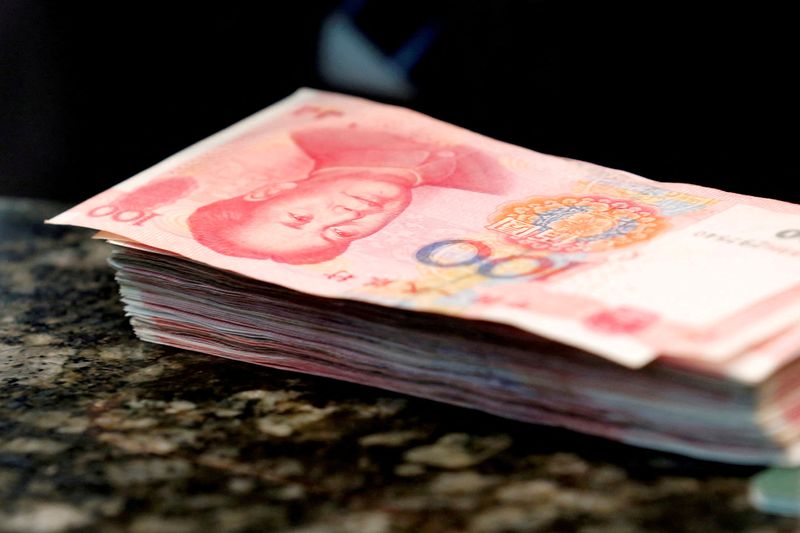By Georgina Lee and Winni Zhou
HONG KONG (Reuters) - The Hong Kong stock exchange will start offering yuan-denominated Chinese stocks from Monday in what it calls a dual counter, a scheme that is seen as part of China's efforts to increase the yuan's use overseas.
The exchange will initially target the offerings at investors holding offshore yuan.
Ultimately, the Hong Kong Exchanges & Clearing (HKEX) aims to enable mainland investors to trade yuan stocks listed in Hong Kong using their onshore yuan.
Here's a look at how the yuan-denominated stock trading works, and the CNH's role.
HOW DOES THE DUAL STOCKS COUNTER WORK?
The HKEX's Dual Counter Model allows investors in Hong Kong to trade stocks concurrently in both Hong Kong dollar and the yuan. A total of 24 companies will start offering yuan counters at the scheme's launch.
The HKEX has said all shares of the same securities in the two trading counters will be fully interchangeable between counters. They will be designated as the HKD-RMB Dual Counter Securities.
The yuan counter will be listed separately under a different, 5-digit stock code that begins with "8"; while the Hong Kong dollar counter will follow a 5-digit number starting with a "0".
The HKEX is also rolling out a market-maker program, so that any price differences between the two counters because of the yuan's moves can be reduced.
IS IT THE FIRST TIME THAT YUAN-DENOMINATED STOCKS WILL BE TRADED ON THE HKEX?
No. There was a dual-currency trading precedent, when Hopewell Highway Infrastructure offered such an option of yuan shares in 2012 to investors, long after its Hong Kong shares first debuted in 2003.
But the yuan counter failed to gain traction due to the significant price gap between the two trading counters.
WHICH INVESTORS WILL TRADE ON THE DUAL COUNTER?
The first batch of investors could be holders of offshore yuan deposits in Hong Kong, which totalled 833 billion yuan ($117 billion) at the end of April, as they look for potentially higher returns in the stock market.
Yuan holders in China's trading partner countries, such as Russia, Pakistan and the Middle East, could also be potential investors.
The HKEX is working with Chinese regulators to allow mainland investors to eventually participate via the Stock Connect investment channel that connects the Hong Kong, Shanghai, and Shenzhen stock exchanges.
Mainland investors currently trading Hong Kong stocks through the southbound leg of the Stock Connect face an exchange rate risk, to hedge which they have to pay a 2% margin to their brokers when they submit their trade orders. Also, investors are told the exact yuan amount they have to pay or receive only at the end of each trade day.
The yuan counter will mean investors will be paying the yuan price for stocks quoted in real time during trading hours.
TELL ME MORE ABOUT THE OFFSHORE YUAN, OR CNH
CNH stands for offshore yuan, launched in 2003 as an experiment in creating a distinct, offshore market for yuan.
The onshore yuan is only partially convertible as China's capital account remains largely closed. Schemes such as the Stock Connect and CNH are part of China’s efforts to gradually open up its capital market to foreigners.
The onshore yuan is largely fungible with CNH and, under normal market conditions, their exchange rates tend to move together. The onshore yuan is more managed by authorities, with the spot rate allowed to trade within a 2% range around the official daily fixing set by China’s central bank. The CNH is driven mainly by demand and supply.
China's yuan is essentially one currency with two exchange rates.
($1 = 7.1140 Chinese yuan renminbi)
